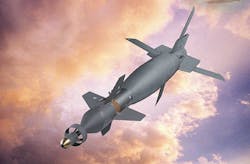Lockheed Martin and Raytheon lock-up contracts for Paveway and AMRAAM smart munitions
Officials of the Air Force Life Cycle Management Center at Hill Air Force Base, Utah, announced a combined $649.7 million order to the Lockheed Martin Corp. Missiles and Fire Control segment in Archibald, Pa., and to the Raytheon Co. Missile Systems segment in Tucson, Ariz., for Paveway II guided bomb production.
Officials of the Air Force Life Cycle Management Center at Eglin Air Force Base, Fla., meanwhile, announced a $104.6 million contract to Raytheon Missile Systems in Tucson, Ariz., to upgrade the guidance section of the Advanced Medium-Range Air-to-Air Missile (AMRAAM).
Raytheon's AMRAAM contract involves foreign military sales to Korea, Saudi Arabia, Australia and Romania.
Related: Air Force tests technology that could enable smart munition to see the way to its target
The GBU-12 Paveway II laser-guided bomb is based on the Mk 82 500-pound general-purpose bomb with added nose-mounted laser seeker and fins for guidance. GBU-12 bombs are produced by Lockheed Martin and Raytheon.
Paveway II refers to the guidance kit, rather than to the bomb. This munition also includes GPS-guided versions.
AMRAAM, meanwhile, is a radar-guided air-to-air missile that uses digital technology, micro-miniaturized solid-state electronics, and active radar guidance for air combat and air defense.
AMRAAM provides multi-shot capability, and can be launched day or night, in all weather conditions. Its autonomous guidance capability provides the pilot with launch-and-leave ability to provide fast engagement of follow-on targets or the option to fire first and then run from targets.
Related: Smart munitions to track and kill sources of RF jamming
AMRAAM's capabilities include quick fly-out, immunity to countermeasures, and the ability to reject radar clutter to attack low-altitude targets. The missile has active radar guidance, multi-shot capability, and the ability to launch from aircraft or from surface-to-air missile sites.
On the Paveway II contract, Lockheed Martin and Raytheon will do the work in locations based on different task orders, and should be finished by July 2023. On the AMRAAM contract Raytheon will do the work in Tucson, Ariz., and should be finished by February 2017.
For more information contact Lockheed Martin Missiles and fire control online at www.lockheedmartin.com, Raytheon Missile Systems at www.raytheon.com, or the Air Force Life Cycle Management Center at www.wpafb.af.mil/aflcmc.
